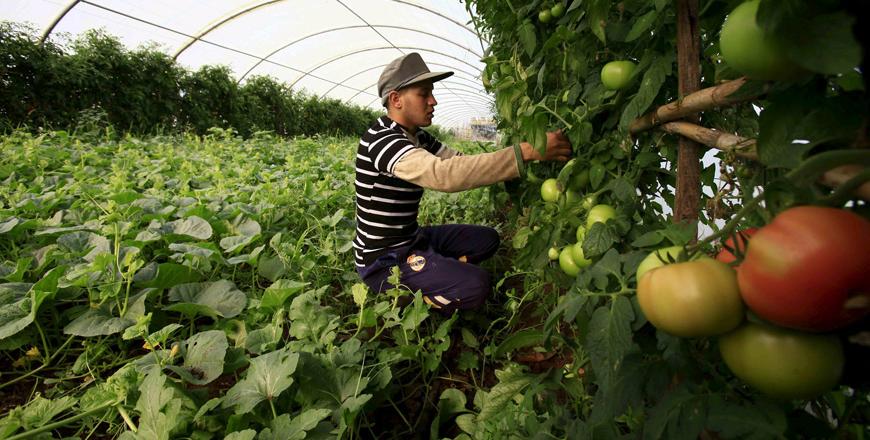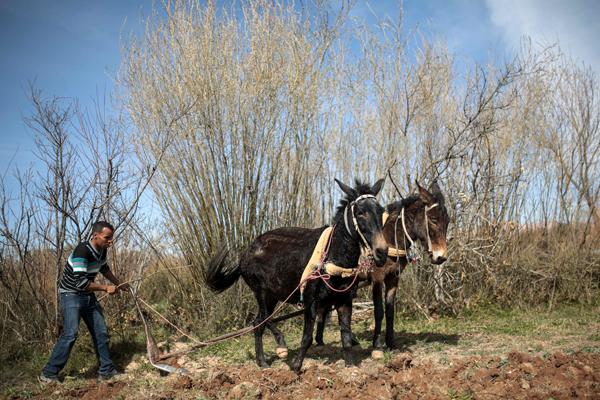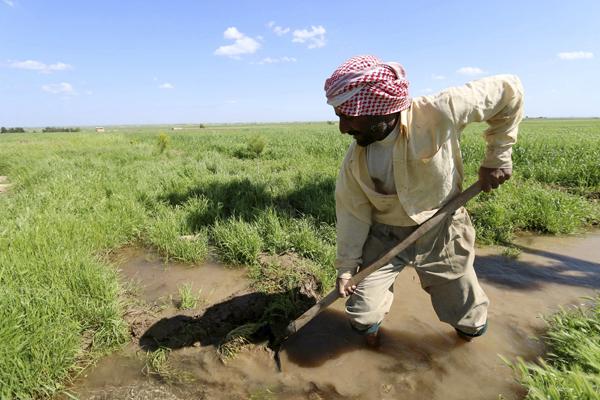You are here
After oil price drop, Algeria tries to boost food crops
By Reuters - Jun 09,2015 - Last updated at Jun 09,2015

A farmer checks on his crop of tomatos in Tipaza, west of Algiers, Algeria, last week (Reutes photo)
SIDI RACHED, Algeria — At Ahmed Bekhi's cereal farm outside Algiers, there are clear signs of Algeria's campaign to increase food production to help curb billions of dollars in imports and offset a sharp fall in world oil prices.
New irrigation lines are in the works and wells have appeared to compliment a steady flow of government supplies of seeds, fertiliser and pesticides. But in an economy emerging from decades of centralised control, farmers complain they are bumping up against restrictive state bureaucracy.
Algeria, a member of the Organisation of Petroleum Exporting Countries (OPEC)is still highly dependent on energy revenues that supply 95 per cent of its exports and 60 per cent of the state budget. With oil prices down by half over the past 12 months, the North African state is feeling the pinch.
The country has around $180 billion in foreign currency reserves to ward off any crisis, but Algeria's state spends about $60 billion a year on imports for everything from cars to medicines and it is looking to reduce this sum.
Foodstuffs represent 20 per cent of the value of imports.
Traditionally one of the world's largest grain importers, Algeria has identified agriculture as an area where it can do more to boost domestic production and has speeded up a reform programme aimed at bolstering its harvests.
Low rainfall this year already means grain production is forecast to be flat at 3.4 million tonnes, highlighting the slow progress in increasing irrigation to lift crop yields.
Sidi Rached, an agricultural region 70 kilometres west of the capital Algiers, shows the task ahead. Government aid appears plentiful, but state paperwork is hobbling progress in a sector that lacks modern technologies and is shackled to the whims of the rainy seasons.
Promised disbursements are slow and even simple procedures can get snarled by rigid officialdom, the farmers say.
Bekhi's farm is one of the few to benefit already from an irrigation programme, with a government-built damn and a network of private wells helping develop the area.
"We are happy with government support, but sometimes there are delays in opening the valves. This is the kind of bureaucracy from local authorities we face," said Bekhi, standing in the middle of a 24-hectare wheat field.
Farms for sale
Besides falling energy revenues, Algeria also has a growing number of mouths to feed, with the population put at 40 million and increasing by an estimated 1 million a year.
Main foodstuffs, including cereals, sugar and milk are subsidised, but there is no such help for some products such as vegetables, which keeps prices high.
Official statistics show the state imports on average 5 million tonnes of wheat and barley a year, but that figure appears to be climbing. It hit some 7.4 million in 2014.
Lower oil revenues make farming reforms key, authorities say.
"We must work for food security especially in these circumstances," said Agriculture Minister Abdul Wahab Nouri. "Dependency on foreign markets is dangerous for the country."
Algeria last year took its first steps towards opening up the farming sector to foreign investors, inviting bids for 16 state-owned farms focused on grains, vegetables, fruit trees and cattle breeding.
Last week, the government signed six deals with US companies for joint ventures in potato and diary production.
The agriculture ministry is hoping its various reforms will see the country grow 6.9 million tonnes of wheat and barley by 2019, against just 3.4 million in 2014.
To achieve that goal, the government plans to raise total irrigated areas to 2 million hectares from 900,000 hectares now. The share of irrigation for cereals is expected to reach 600,000 hectares, up from 60,000 hectares currently.
All other produce, including meat and vegetables, are also projected at much higher production levels within five years.
But experts and farmers say these plans may be hit not just by bureaucracy but also by climate change, which is expected to bring less rain and higher temperatures in the coming years.
"The degradation of natural resources will exert an enormous pressure on the food security. This could be aggravated by climate change," said Mohammed Henni, professor of nature and life sciences at Algiers University.
Mechanisation
The need for improved irrigation has been underscored by recent droughts, which pushed Algeria's grains harvest down from 4.9 million tonnes in 2013 to some 3.4 million last year. Output had hit a record 6.9 million tonnes in 2009
Besides rains, Algeria's farming sector also suffers from a lack of skilled labour, with youths attracted to better working conditions in other sectors and drawn away from rural areas by government promises of cheap credits to start small businesses.
To help tackle this shortage, the government says it will focus on using better quality seeds as well as improved mechanisation in the agriculture system.
However, farmers complain they do not benefit from increased state support due to a lack of follow-up by senior officials.
"The government has taken enough measures to help us boost output, but officials in Algiers do not come to monitor the implementation stage," said Djelloul Guiri, owner of a 12-hectare field full of orange trees.
A local government official, who declined to be named, agreed that most farmers' problems were due to mismanagement and bureaucracy. The government has approved plans to improve processes and to modernise, he said, but gave no details.
The government says it has earmarked $3.18 billion to develop agriculture in 2015 and is spending heavily to develop food products, especially grains, through mainly financial incentives to farmers including zero interest loans.
"Without agriculture, this country will not be able to resist a crisis," said farmer Ali Kardji. "Oil and gas will not feed us forever."
Related Articles
RABAT — Abnormally dry weather across North Africa is threatening to become another financial headache for Morocco and neighbouring Tunisia
ABU DHABI/HASAKA, Syria — Syria's war has destroyed agricultural infrastructure and fractured the state system that provides farmers with se
SIDI FREDJ, Algeria — For generations Algerians like the Gueldasmi family have barely eked out a living growing prickly pear fruits, but tha














